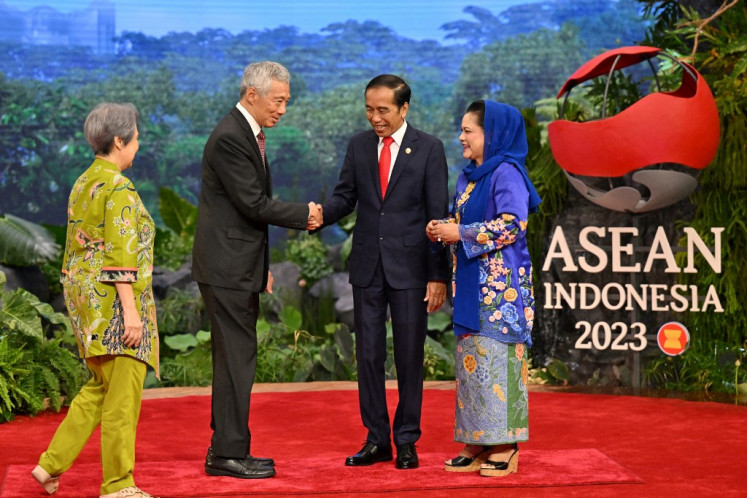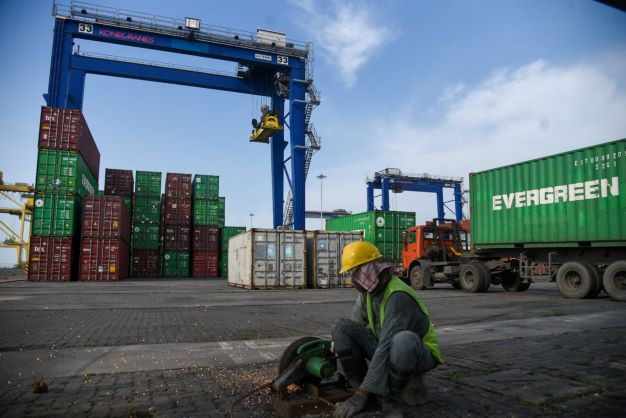Cosmetics industry remains attractive, businesses say
LOOKING GOOD: Two women try out cosmetic products at a mall in Jakarta in this file photo
Change Size

LOOKING GOOD: Two women try out cosmetic products at a mall in Jakarta in this file photo. According to the Association of Indonesian Cosmetics Manufacturers (Perkosmi), local producers expect the industry to grow by 40 percent this year to around Rp 7 trillion. (JP)
Despite an influx of cosmetics products from foreign companies, including herbal-based products, domestic manufacturers remain upbeat about their prospects and stand ready to compete for their share of the nation's lucrative beauty business.
The Association of Indonesian Cosmetics Manufacturers (Perkosmi) expects the trend for preferring local products, most of which include traditional and herbal ingredients, will remain strong in an era where consumers prefer to have fewer chemical substances in their cosmetics.
Perkosmi chairwoman Putri Kuswishnuwardhani said in a recent interview that, for some, the use of traditional products had become a rapidly growing lifestyle choice.
"Using traditional cosmetics has been an evergreen style among local and overseas customers," said Putri, who is also the vice president of PT Mustika Ratu, one of the top traditional and herbal cosmetics makers in the country.
Perkosmi currently has more than 1,000 members, 900 of which are small and medium players.
"The cosmetics industry has been growing steadily and has become a lifeline for its thousands of employees," she said late last month after representing Mustika Ratu's founder Mooryati Soedibyo in receiving the Outstanding Entrepreneurship Award at the Asia Pacific Entrepreneurship Awards ceremony.
Cosmetics include skin-care creams, lotions, powders, perfumes, lipsticks, nail polish, makeup, hair sprays and gels and deodorants.
The country's cosmetics industry was last year valued at Rp 5 trillion (US$456 million), and the association expects a 40 percent growth this year to Rp 7 trillion.
Despite the influx of foreign-branded products, the majority of the nation's cosmetics industry is still being controlled by local players, according to Perkosmi.
Mustika Ratu currently holds a 35-40 percent market share, with some of its products dominating the market. Its face mask, for instance, holds 80 percent of the domestic market.
In the first six months of this year, Mustika Ratu generated Rp 144 billion in sales revenue, up by 29 percent from Rp 112 billion during the same period last year.
The Martha Tilaar Group, another large traditional cosmetics and herbal products manufacturer, holds a 20-25 percent market share and is the provider of leading color cosmetics products (both decorative and makeup) and skin-care items.
However, despite its increasing value, the industry is yet to become a major contributor of foreign income, as exports remain fairly low.
In 2005, for instance, the sector contributed only US$59 million in forex revenue, showing little growth from its $41 million in 2001, Industry Ministry data show.
Putri admitted that exports had not been good, especially for smaller businesses, in part blaming the government for that.
"First, the government's free trade policy has led to foreign players paying very low custom and excise taxes, making their products fairly affordable for the public," she said.
"Local players, on the other hand, can hardly export their products because of strict trade policies from receiving countries who seek to protect their own industries."
She added that foreign products, especially those from China, Malaysia and Vietnam, could capture local buyers' hearts more easily than domestic and European items could, thanks to their low prices.
Samuel Pranata, marketing director at Martha Tilaar, acknowledged the phenomenon, but said local players had no alternative but to improve the quality of their products to be able to maintain their dominance in the domestic market.
"In this case, domestic players must be able to create innovative products that meet buyers' needs. Not many foreign products suit local consumers' skins, because of differences in climate," he said.
Martha, he added, generated Rp 600 billion ($64 million) in sales last year, with a target of a 20 percent increase this year. (ewd)









